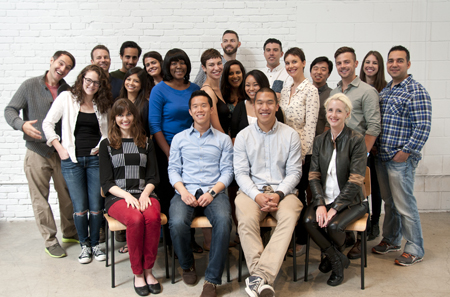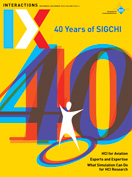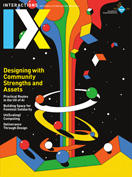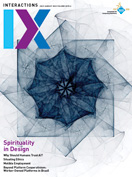Authors: Ashley Karr
Posted: Fri, May 16, 2014 - 10:12:56

Meaning and engagement
Before I began this course, I was burnt out. My work had lost meaning and engagement. I had been building technology for organizations and groups that had lost their soul and passion for good design. Instead, they pursued profit and fantasy deadlines. The irony of engaging in a type of engineering called “human-centered design” and “user experience design” in environments like this was not amusing. After the first day of this course, meaning and engagement had found their way back into my Monday through Friday 9 to 5. Why? The people. But I will write more about that later.
Leverage
I found my way into anthropology, human factors engineering, human-computer interaction (HCI), and user experience (UX) design because I truly care about our world, its people, and other living creatures. I saw how these fields could help me operationalize my instinct to help. Additionally, by leveraging the power of computing technology, I could help a lot of people with minimal effort. (Spoken like a true humanitarian engineer!)
What I now realize is by teaching others to be empathetic, ethical, human-centered designers and makers of computing technology, I am leveraging the boundless energy and power of my students, as well. In the past ten weeks, my co-instructor and I have overseen roughly eighty projects, and a number of these have the potential to become consumer facing. Our eighteen students will go on to rich careers in UX, and I think it safe to say that they will each be involved in at least one small design improvement per month for the next ten years at minimum. That means that my co-instructor and I will be part of at the very least 2,160 design improvements over the next decade because they will draw from the principles learned in our class to do their jobs properly. If each of those design improvements saves ten million people one minute of their time on a mundane task like bill pay, this means 21,600,000,000 minutes have been freed to spend on hugging children, taking deep breaths, and other meaningful things.
Deepening my KSAOs
KSAOs are the job-related knowledge, skills, attitudes, and other characteristics necessary for one to perform their job successfully. When one teaches a subject, their KSAOs deepen, because teaching is not separate from but an integral part of the learning process. My co-instructor and I feel that we’ve learned more than our students by teaching them UX fundamentals. I am not suggesting that the students haven’t paid attention—on the contrary! It is their questioning, challenging, creating, and building upon what we’ve taught them that has enabled us to achieve an even greater mastery of our trade. Interestingly, I now have an ability to discern who of my professional peers has taught and who has not. Teaching, like parenting, gives one a sense of humility and compassion that is hard to reach without the challenges that students and children place in front of you. I do have to add in the closing of this paragraph that my co-instructor and I are very, very proud of our students for thinking critically, independently, and deeply about design and technology. It makes us very proud—the good kind of proud.
Community and personal relationships
It is always and forever about the people. When I applied for the position to teach the UX design immersive course, I focused on the students and the relationships I would create with them. I thought about the people they were before applying for the course, the experiences we would have together over ten weeks, and the people they would become after graduation. I was so excited to meet the students on the first day of class, see their faces, hear their voices, and get to know about them as people rather than social media profiles. The relationships I have built with my students mean more than I had anticipated, and I have the added joy of finding life-long friends in my co-instructor, Jill; the course producer, Jaime; and the staff that supported us through the course. Beyond that, I have met many wonderful guest speakers, leaders, community organizers, and other professionals who have also enriched my experience and career. I am so thankful that all these wonderful people are now in my life, and that we are all working at minimum forty hours per week, two-thousand hours a year to help make the world a better place. I get chills when I think about it.
Gratitude
For no reason whatsoever, I was born into a situation where I had opportunities that few people have ever had. I am a literate, educated, financially independent person developing cutting-edge technology. I am keenly aware of and grateful for these opportunities and believe them accidents of history and birth and not something that I earned or deserve. It seems that teaching others to be empathetic, ethical, human-centered designers of computing technology is a good way of making sure this privilege is not wasted.
Inspiration
I am happy to say that I am no longer burnt out, and I have rediscovered meaning and engagement in my work thanks to my students, co-instructor, course producer, and supportive staff. I have found that when I lack inspiration, motivation, and energy, what I am missing are quality relationships and interactions with my peers and colleagues.
In conclusion
I hope this inspiration carries over to you, the reader, and inspires you to become a teacher or mentor. I will end this essay with a direct quote from my co-instructor and good friend, Jill DaSilva. Before I sat down to write this article, I asked her why she decided to teach this course. Here is her answer:
I teach because I have the opportunity to give back. At a time in my life when I needed to support my son and myself, there were people there to help me, teach me, and give me the chance to do what I loved for a living. I’m paying it forward. Also, what we make is meaningful, and I get to teach our students how to create things that improve other people’s circumstances. If we can remove suffering and increase happiness though what we make, then we are living good lives.
Posted in: on Fri, May 16, 2014 - 10:12:56
Ashley Karr
View All Ashley Karr's Posts






Post Comment
No Comments Found